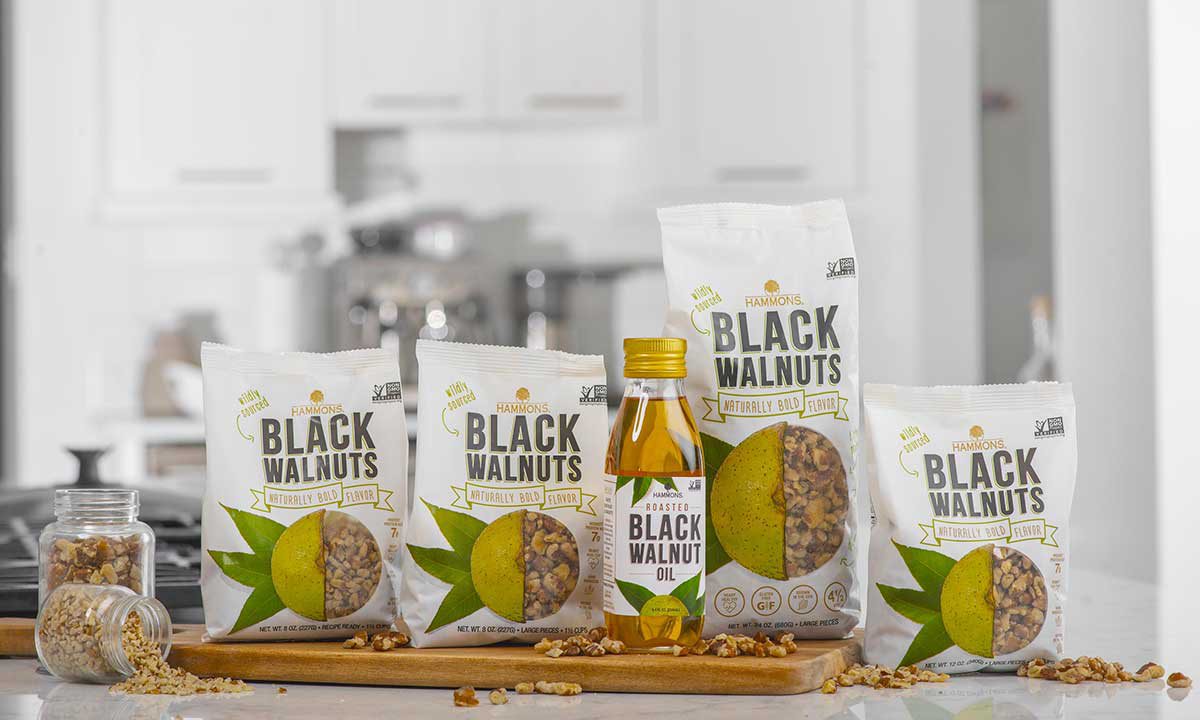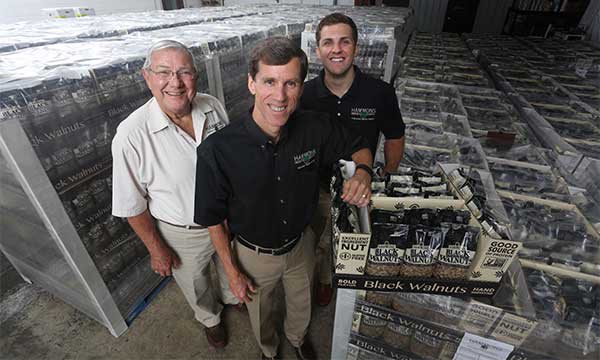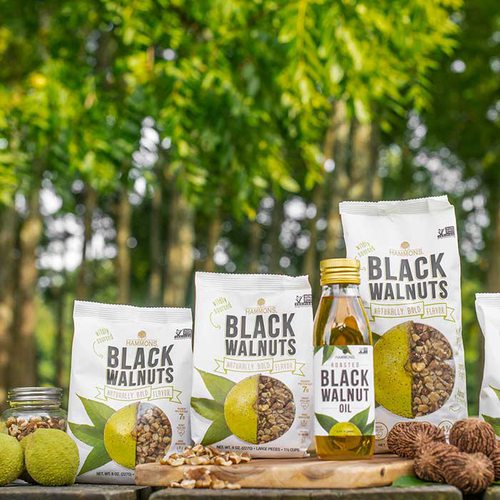
Small to Mid-Sized
Wild Black Walnuts Form the Core of Hammons Products Co.’s Business
For Hammons Products Co., finding a place to put down roots meant finding where the company’s core product had its own roots—literally. Missouri’s abundant black walnut trees allowed the company to branch out into a national and global presence.
By Claire Porter
Sep 2018

Certain flavors are uniquely Missourian—cashew chicken springs to mind—but the state’s most distinctive and abundant flavor comes in massive green hulls that house black walnuts, the cornerstone of Hammons Products Co. “Missouri has the highest concentration of black walnut trees in the entire country,” says Jacob Basecke, the company’s vice president of sales and marketing. “We are in the heartland of black walnut country.”
In the 1940s, Basecke’s great-grandfather Ralph Hammons noticed an increasing demand for black walnuts in the grocery store he owned, so he started Hammons Products Co. in Stockton to take advantage of the ample product underfoot. When the company started in 1946, it brought in about 200,000 pounds of black walnuts per year. Now, the company averages 20 to 25 million pounds annually.
As a fully wild-grown product, black walnuts don’t lend themselves to easy business. Black walnut trees are alternate bearing, so crop sizes fluctuate each year. To mitigate the swings, the company can harvest in states as far north as Michigan and as far east as New York. The walnuts need to be harvested by hand and are in season from October 1 through the first week of November. With trees growing throughout the country, collecting the harvest becomes a crowd-sourced effort. “It’s a community harvest,” Basecke says. “Many people make hundreds if not thousands of dollars just by picking up these black walnuts that they wouldn’t have any other use for.” Collected walnuts are brought to one of Hammons Products Co.’s nearly 250 hulling stations, located across 15 states, where the hulls are removed, the nuts are weighed, and the harvesters are paid for their haul. Then, the nuts are sent to the Stockton facility, where they’re dried, processed and boxed or packaged for sale.
This year, Hammons Products Co. unveiled new packaging that celebrates the Midwestern harvesters and gatherers who are responsible for bringing the bold nuts to shelves every year. “We have a really unique story, so we wanted to showcase that to the world,” Basecke says. “It is truly remarkable to see how passionate and how enthusiastic people are that are involved in the harvest. Not a lot of companies get the opportunity to connect with people in that regard.”

The new packaging also highlights some of the nut’s applications, unique flavor and health benefits. “My great grandmother, so this is Ralph’s wife, Fae Hammons, she’s 103 years old, and we say it’s got to be because of all those black walnuts she’s been eating all these years,” Basecke says with a laugh.
The classic applications of black walnuts for baking, ice cream and, more recently, beer (most notably in Piney River Brewing Co.’s Black Walnut Wheat beer) have kept demand steady, but the increasing attention on organic and natural foods has opened up avenues for growth for the 72-year-old company. “We’re starting to see [that] the whole plant-based food trend has elevated some new markets for us, and our retail business has grown quite a bit,” Basecke says.
Because black walnuts have only a 10-percent yield of edible nut meat—low compared to the 50 to 60 percent yield you see with pecans and almonds—each harvest leaves a lot of leftover shells. Hammons Products Co. has found success in selling shells for industrial uses such as water filtration in the oil industry, sandblasting or soft-grit abrasive cleaning. Black walnut shells were even used to clean the Statue of Liberty, and nowadays, they’re replacing the crumb rubber in artificial turf fields.
A strategic eye on sustainable growth and exploration into new markets helped Basecke’s grandfather Dwain Hammons rapidly grow the business through the ’70s and ’80s, and under Brian Hammons leadership as current president, the company has continued to feed demand for Missouri’s black gold. Within the past year, Hammons Products Co. has expanded its retail package business with products reaching store shelves nationwide in Walmart, Kroger, Safeway and other major retailers, which Basecke says is a turning point for the company. Ultimately, he advises companies looking to grow to be true to their stories and to be passionate about how they tell that story. And sometimes it helps to really love your product, too. “Whenever we go to a restaurant, it seems like either Brian or Dwain will always have a bag of black walnuts inside their jacket, just in case,” Basecke says with a laugh. “The love of black walnuts certainly runs in our blood.”

Biz Basics
Hammons Product Co.
Facebook | Instagram | Twitter
Year Founded: 1946
Headquarters: Stockton
Company Type: Privately Owned
Employees in 417-Land: 85 year-round, plus an additional 20 during harvest season












